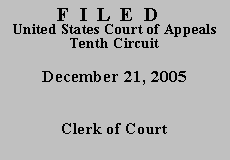

| CHARLES EDWARD WESLEY,
vs.
PATRICK W. SNEDEKER, Warden,
Lea County Correctional Facility |
|
The issuance of a COA is jurisdictional. Miller-El v. Cockrell, 537 U.S. 322, 336 (2003). Where the district court dismisses a petition on procedural grounds, a COA requires the inmate to demonstrate that it is reasonably debatable whether (1) the petition states a valid claim of the denial of a constitutional right, and (2) the district court's procedural ruling is correct. Slack v. McDaniel, 529 U.S. 473, 484 (2000); see also Miller-El, 537 U.S. at 327. Under the one-year statute of limitations set forth in 28 U.S.C. § 2244(d)(1), the district court's conclusion that the petition was time-barred is not reasonably debatable, given the historical facts.
Mr. Wesley was convicted, after a jury trial, of one count of criminal sexual penetration and three counts of criminal sexual contact of a minor. He was sentenced to thirty-one years, nine suspended, for a total of 22 years, followed by two years of parole and five years of supervised probation. The state district court entered judgment and sentence on May 10, 2000. R. Doc. 12, Ex. A. The New Mexico Court of Appeals affirmed the conviction on November 16, 2000. R. Doc. 1 at 3; Doc. 12, Ex. F. Mr. Wesley did not seek certiorari from the New Mexico Supreme Court. See N.M. R. § 12-502(B) (petition for writ of certiorari must be filed within 20 days after final action by the court of appeals; final action is the later of filing of court of appeals decision or disposition of last motion for rehearing that was timely filed).
Rather, on December 18, 2001, he filed a petition for a writ of habeas corpus in state district court. R. Doc. 12, Ex. G. The district court denied the petition on August 1, 2003. Doc. 12, Ex J. Mr. Wesley sought certiorari review of the denial of his habeas petition, which was denied by the New Mexico Supreme Court on October 1, 2003. R. Doc. 12, Ex. N. Mr. Wesley filed the instant petition in federal court on January 6, 2004. R. Doc. 1.
We agree with the State that Mr. Wesley's conviction became final on December 6, 2000, when the twenty days to seek certiorari review by the New Mexico Supreme Court had expired. R. Doc. 11 at 2; Doc. 20 at 2. By the time he sought state collateral review on December 18, 2001, the one-year limitation period had run and there was nothing to toll. Id.
The federal petition filed thereafter is clearly untimely. The district court considered the effect of tolling due to the filing and consideration of the state habeas petition. Such consideration is only necessary assuming an additional 90 days from the date of the New Mexico Court of Appeals decision on the direct criminal appeal. Although "the date on which the judgment became final by the conclusion of direct review or the expiration of the time for seeking review," § 2244(d)(1)(A), normally includes the time to seek certiorari from the United States Supreme Court, Clay v. United States, 537 U.S. 522, 527 n.3 (2003), that presupposes that a defendant exhausts relief from the state court of last resort. See 28 U.S.C. § 1257(a); S. Ct. R. 13(1) ("A petition for a writ of certiorari seeking review of a judgment of a lower state court that is subject to discretionary review by the state court of last resort is timely when it is filed with the Clerk within 90 days after entry of the order denying discretionary review."); Locke v. Saffle, 237 F.3d 1269, 1273 (10th Cir. 2001). We also note that State defendants must undergo one complete round of the state's appellate review process in order to exhaust their claims; it would be anomalous to extend the limitation period by 90-days (as the district court did) to allow for the potential of a certiorari petition before the United States Supreme Court when the defendant failed to seek discretionary review from the state's highest court. O'Sullivan v. Boerckel, 526 U.S. 838, 845-48 (1999).
Although Mr. Wesley argues that his petition was timely because of unspecified "'time stops' when certs were filed, motions were filed, []or the 3-day mail rule," or circumstances arising from his present incarceration, what he has provided simply does not call into question the untimely nature of the petition, or the district court's apparent rejection of equitable tolling. See Marsh v. Soares, 223 F.3d 1217, 1220 (10th Cir. 2000).
We DENY a COA, DENY the pending motion as not raised below and
unexhausted, 42 U.S.C.1997e(a), and DISMISS the appeal.
Entered for the Court
Paul J. Kelly, Jr.
Circuit Judge